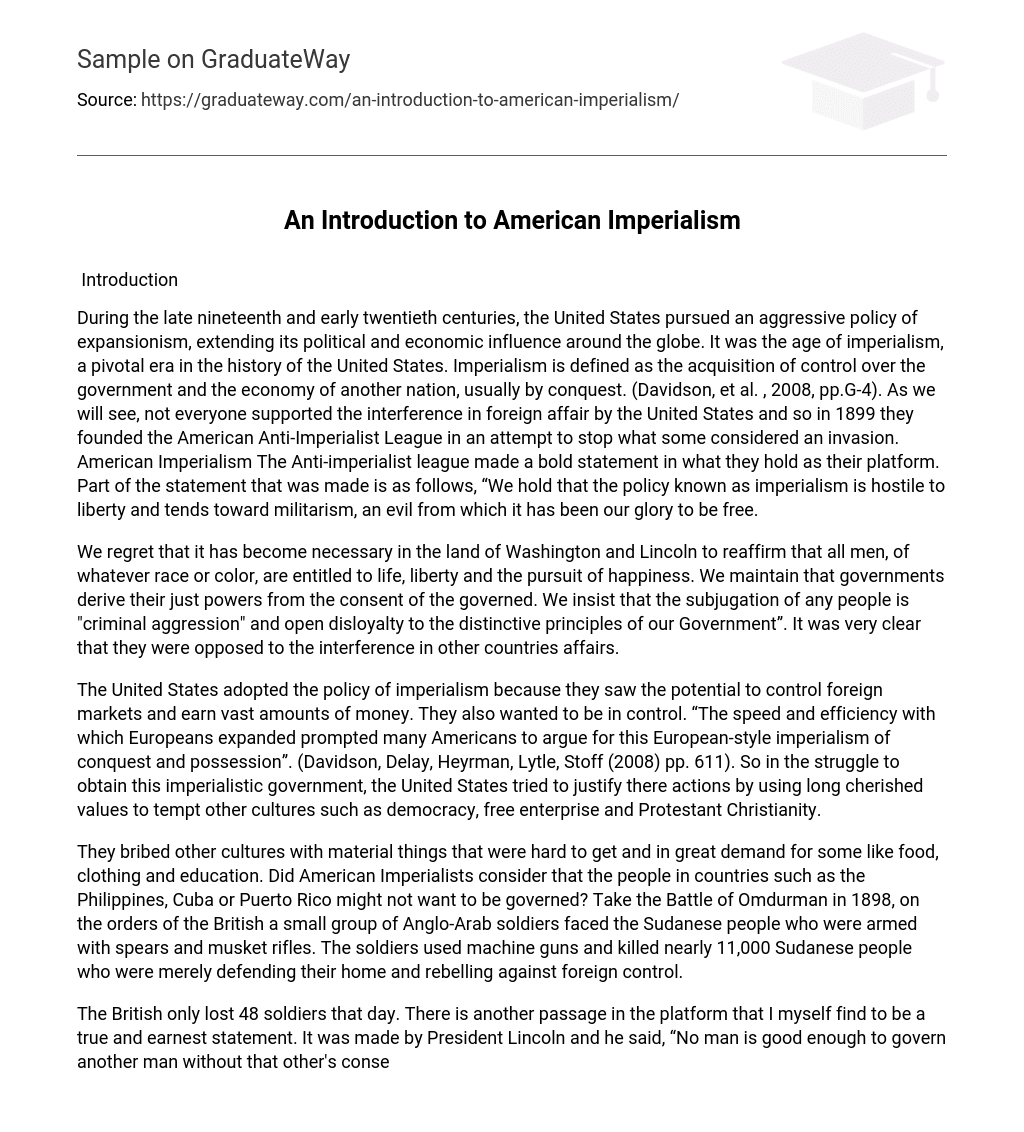Introduction
During the late nineteenth and early twentieth centuries, the United States pursued an aggressive policy of expansionism, extending its political and economic influence around the globe. It was the age of imperialism, a pivotal era in the history of the United States. Imperialism is defined as the acquisition of control over the government and the economy of another nation, usually by conquest. (Davidson, et al. , 2008, pp.G-4). As we will see, not everyone supported the interference in foreign affair by the United States and so in 1899 they founded the American Anti-Imperialist League in an attempt to stop what some considered an invasion. American Imperialism The Anti-imperialist league made a bold statement in what they hold as their platform. Part of the statement that was made is as follows, “We hold that the policy known as imperialism is hostile to liberty and tends toward militarism, an evil from which it has been our glory to be free.
We regret that it has become necessary in the land of Washington and Lincoln to reaffirm that all men, of whatever race or color, are entitled to life, liberty and the pursuit of happiness. We maintain that governments derive their just powers from the consent of the governed. We insist that the subjugation of any people is “criminal aggression” and open disloyalty to the distinctive principles of our Government”. It was very clear that they were opposed to the interference in other countries affairs.
The United States adopted the policy of imperialism because they saw the potential to control foreign markets and earn vast amounts of money. They also wanted to be in control. “The speed and efficiency with which Europeans expanded prompted many Americans to argue for this European-style imperialism of conquest and possession”. (Davidson, Delay, Heyrman, Lytle, Stoff (2008) pp. 611). So in the struggle to obtain this imperialistic government, the United States tried to justify there actions by using long cherished values to tempt other cultures such as democracy, free enterprise and Protestant Christianity.
They bribed other cultures with material things that were hard to get and in great demand for some like food, clothing and education. Did American Imperialists consider that the people in countries such as the Philippines, Cuba or Puerto Rico might not want to be governed? Take the Battle of Omdurman in 1898, on the orders of the British a small group of Anglo-Arab soldiers faced the Sudanese people who were armed with spears and musket rifles. The soldiers used machine guns and killed nearly 11,000 Sudanese people who were merely defending their home and rebelling against foreign control.
The British only lost 48 soldiers that day. There is another passage in the platform that I myself find to be a true and earnest statement. It was made by President Lincoln and he said, “No man is good enough to govern another man without that other’s consent. When the white man governs himself, that is self-government, but when he governs himself and also governs another man, that is more than self-government-that is despotism. ” “Our reliance is in the love of liberty which God has planted in us. Our defense is in the spirit which prizes liberty as the heritage of all men in all lands.
Those who deny freedom to others deserve it not for themselves, and under a just God cannot long retain it. ” How wonderfully profound this statement is and if government today would remember this great presidents’ statement, we might come to better understand that the Anti-Imperialist League was right in standing against this action just as we should today. Like the great imperialists of bygone days, even today America’s rulers share a long history of creating fear in people – one “evildoer” or another always threatens the destruction of life beyond our own borders.
The willful disruption of other cultures they deem as inferior or in need of “our” help even if it is unwanted. Then, while the frightened population huddles gratefully under the umbrella of power, the government pursues an agenda calculated to transfer vast sums of public wealth into the hands of the corporate and political elite. The United States became involved in Philippines, Puerto Rico and Cuba due to the Imperialist Policy. The problem came after the fact in trying to decide hat to do with the countries. After the acquisition there was a conflict which took the lives of 5,000 Americans, 25,000 rebels and an estimated 200,000 innocent civilian men woman and children. The war lasted 3 years. So in looking at this type of control by a super power over small countries and there people, is the death of the people and sometimes the entire culture and way of life worth the take over? It is basically no different than communistic take over and rule.
To crush a country, take it over and then introduce modern industrialization to make them independent and to grant authority to the local officials seems hypocritical when if we had left the people alone in the first place, there government would have remained in control, people would not have lost their lives in such extraordinary numbers and for the most part life would have continued as normal. As a country with power I think that there are many more ways to introduce positive industrialization that to force it by unwelcomed control, so for this reason the Anti-Imperialist views are shared with many.
Only time will tell if the platform which failed so many years ago will eventually rise again and possible succeed.
References
- Davidson, J. W. , & Delay, B. (2008). Nation of Nations. Boston: McGraw Hill Jeffrey A Engel. (2008).
- The Democratic Language of American Imperialism: Race, Order, and Theodore Roosevelt’s Personifications of Foreign Policy Evil. Diplomacy & Statecraft, 19(4), 671. Retrieved April 6, 2009, from Research Library database. (Document ID: 1623313881). http://www. fordham. edu/halsall/mod/1899antiimp. html





